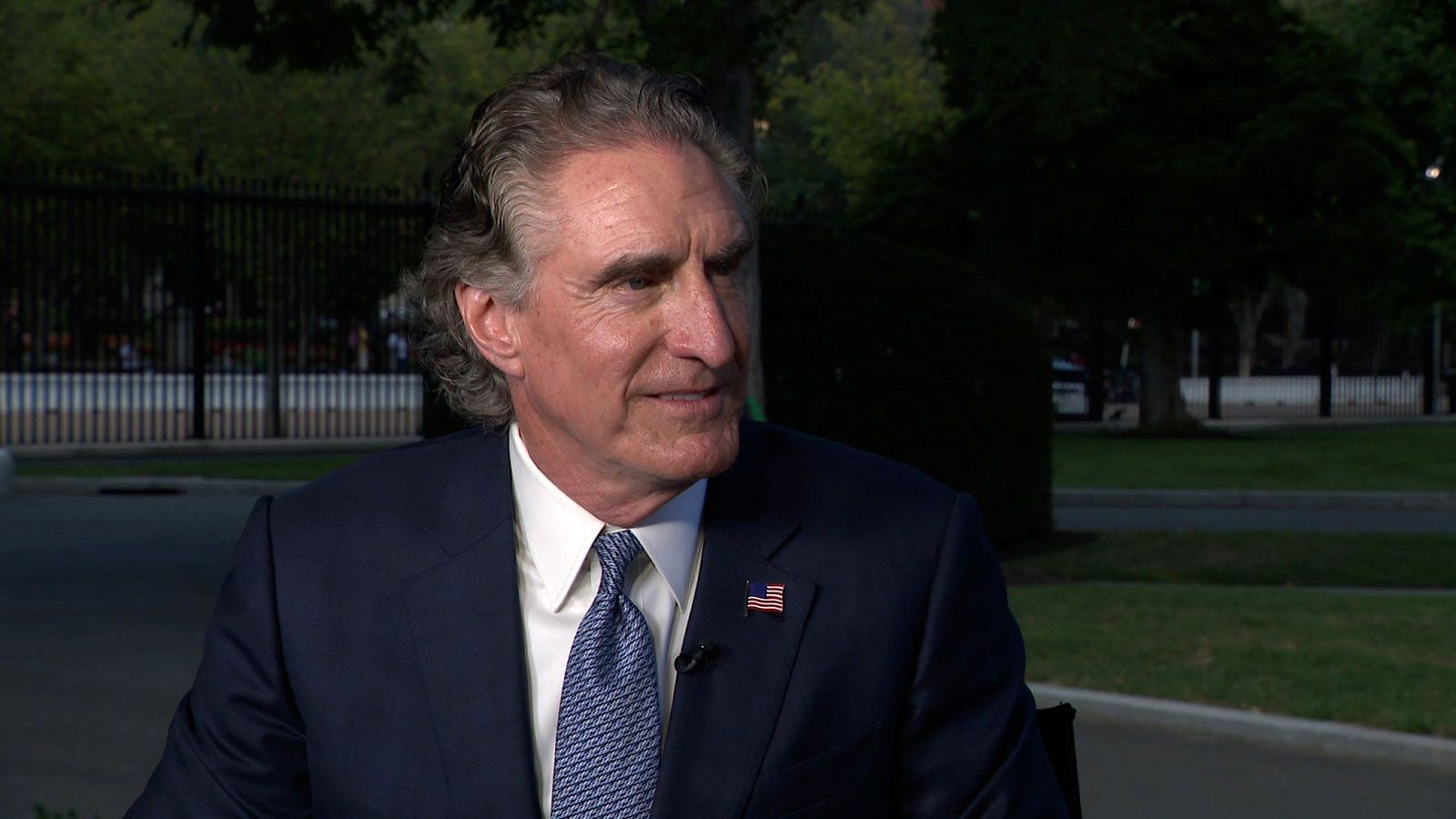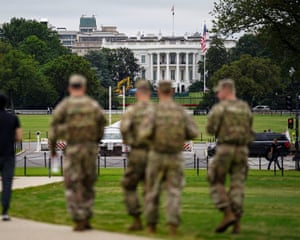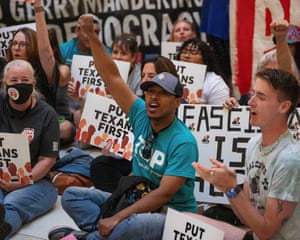
Justice Department seeks to dismiss lawsuit filed by Proud Boys over January 6 prosecutions
Entities mentioned:
- Justice Department: Justice, Duty, Professional pride
- Proud Boys: Revenge, Self-preservation, Indignation
- Donald Trump: Loyalty, Power, Influence
- Joe Biden: Justice, Duty, Control
- Enrique Tarrio: Self-preservation, Recognition, Indignation
Article Assessment:
Credibility Score: 75/100
Bias Rating: 45/100 (Center)
Sentiment Score: 35/100
Authoritarianism Risk: 25/100 (Generally Democratic)
Bias Analysis:
The article presents multiple viewpoints, including those of the Justice Department, the Proud Boys, and Trump's perspective. While it leans slightly towards emphasizing the Justice Department's stance, it also provides context for the opposing arguments.
Key metric: Rule of Law Index
As a social scientist, I analyze that this article highlights the ongoing tension between political interests and the justice system in the aftermath of the January 6 Capitol attack. The Justice Department's move to dismiss the Proud Boys' lawsuit reinforces its commitment to upholding the rule of law, despite political pressure. This case underscores the challenges in maintaining an impartial justice system in a polarized political climate. The pardons issued by Trump and the subsequent lawsuit by the Proud Boys reveal the complex interplay between executive power, judicial processes, and far-right groups' attempts to reframe their actions. This situation may impact public perception of the justice system's integrity and the balance of powers in the U.S. government.

Burgum says Trump deploying National Guard to Democratic-led cities is not political: ‘He’s not targeting anything’
Entities mentioned:
- Doug Burgum: Loyalty, Duty, Professional pride
- Donald Trump: Control, Power, Influence
- Democratic Party: Self-preservation, Indignation, Justice
- Republican Party: Law and order, Control, Power
- JB Pritzker: Indignation, Self-preservation, Autonomy
- National Guard: Duty, Security, Control
Article Assessment:
Credibility Score: 65/100
Bias Rating: 55/100 (Center)
Sentiment Score: 35/100
Authoritarianism Risk: 65/100 (Authoritarian Tendencies)
Bias Analysis:
The article presents both Republican and Democratic viewpoints, but gives slightly more space to the administration's perspective. It includes some fact-checking of claims, indicating an attempt at balanced reporting.
Key metric: Violent Crime Rate
As a social scientist, I analyze that this article highlights the increasing politicization of law enforcement and public safety measures in the United States. The deployment of the National Guard to Democratic-led cities by a Republican president is framed as a non-partisan move to combat crime, but the underlying political tensions are evident. This action could potentially impact the violent crime rate, but the effectiveness is questionable given the complex nature of urban crime and the potential for increased tensions between federal and local authorities. The article also reveals a growing divide in perceptions of crime and appropriate responses between the two major political parties, which could have long-term implications for national unity and governance.

Hegseth fires top US general after Iran assessment that angered Trump
Entities mentioned:
- Mark Milley: Professional pride, Duty, Loyalty
- Donald Trump: Power, Control, Revenge
- Pete Hegseth: Loyalty, Ambition, Influence
- US Military: Security, Duty, Professional pride
- Iran: Self-preservation, Security, Power
Article Assessment:
Credibility Score: 55/100
Bias Rating: 60/100 (Center)
Sentiment Score: 30/100
Authoritarianism Risk: 65/100 (Authoritarian Tendencies)
Bias Analysis:
The article appears to lean slightly right, presenting the firing as a decisive action without much context. However, it doesn't overtly praise or criticize the decision, maintaining a relatively neutral tone.
Key metric: Military Readiness and Leadership Stability
As a social scientist, I analyze that this event signifies a significant disruption in the chain of command and civilian-military relations in the US. The firing of a top general over a disagreement with the President's views on Iran suggests potential politicization of military leadership. This could impact military readiness and strategic decision-making, as well as potentially erode trust between civilian leadership and military professionals. The abrupt change in high-level military personnel may lead to instability in military strategy and operations, particularly concerning Middle East policy. Furthermore, this action might be perceived as an attempt to align military leadership more closely with political objectives, potentially compromising the military's traditional role as an apolitical institution.

‘Debilitating consequences’ in Uganda after USAID cuts – photo essay
Entities mentioned:
- Democrats: Complacency, Self-preservation, Obligation
- Maine oysterman: Moral outrage, Determination, Duty
- California governor: Competitive spirit, Righteousness, Indignation
- Donald Trump: Power, Self-preservation, Revenge
- Kilmar Ábrego García: Self-preservation, Security, Freedom
- US Government: Control, Security, Power
Article Assessment:
Credibility Score: 70/100
Bias Rating: 40/100 (Lean Left)
Sentiment Score: 30/100
Authoritarianism Risk: 55/100 (Mixed/Neutral)
Bias Analysis:
The headlines lean slightly left, critiquing Trump and highlighting opposition to his policies. However, they also present diverse viewpoints, including criticism of Democrats, which adds some balance.
Key metric: Immigration and Population Growth
As a social scientist, I analyze that this collection of headlines reflects a complex political landscape centered around immigration policy and its broader implications for US demographics and politics. The decline in immigrant population growth after 50 years of increase signifies a major shift in US population dynamics, likely influenced by stricter immigration policies. This change could have far-reaching effects on the economy, social fabric, and political balance of the country. The headlines also highlight the polarization in American politics, with different actors taking strong stances on immigration and related issues. The involvement of figures from various levels of government (local, state, federal) in these debates underscores the multi-faceted nature of the immigration issue in the US political system.

Court tosses Trump lawsuit against Maryland judges over US deportations
Entities mentioned:
- Donald Trump: Power, Control, Revenge
- Maryland judges: Duty, Justice, Professional pride
- US courts: Justice, Duty, Independence
Article Assessment:
Credibility Score: 75/100
Bias Rating: 45/100 (Center)
Sentiment Score: 55/100
Authoritarianism Risk: 20/100 (Strongly Democratic)
Bias Analysis:
The article presents a factual account of the court's decision without overtly favoring either side. The neutral tone and focus on the legal outcome, rather than political implications, suggest a centrist approach to reporting.
Key metric: Rule of Law Index
As a social scientist, I analyze that this court decision reinforces the separation of powers and judicial independence in the United States. By dismissing Trump's lawsuit against Maryland judges over deportation rulings, the court system is asserting its autonomy from executive interference. This upholds the principle of checks and balances, crucial for maintaining the rule of law. The dismissal suggests that attempts to pressure or intimidate judges through lawsuits are unlikely to succeed, which may deter similar actions in the future and strengthen judicial impartiality.

EPA urged by state AGs to axe funds for 'radical' climate project accused of training judges
Entities mentioned:
- Environmental Protection Agency (EPA): Control, Power, Duty
- Republican state attorneys general: Righteousness, Moral outrage, Justice
- Lee Zeldin: Control, Duty, Ambition
- Environmental Law Institute (ELI): Influence, Legacy, Recognition
- Climate Judiciary Project (CJP): Influence, Legacy, Professional pride
- Austin Knudsen: Righteousness, Moral outrage, Justice
- Donald Trump: Power, Control, Legacy
- American Energy Institute: Competitive spirit, Self-preservation, Influence
- Alliance for Consumers: Justice, Self-preservation, Influence
- Ted Cruz: Righteousness, Moral outrage, Competitive spirit
Article Assessment:
Credibility Score: 65/100
Bias Rating: 75/100 (Lean Right)
Sentiment Score: 30/100
Authoritarianism Risk: 45/100 (Mixed/Neutral)
Bias Analysis:
The article leans right, evidenced by its exclusive reliance on Republican sources and framing of environmental education as 'woke climate propaganda'. It presents the conservative perspective prominently while offering minimal counterbalance from the criticized organizations.
Key metric: Environmental Policy Effectiveness
As a social scientist, I analyze that this article highlights a significant conflict between conservative state officials and environmental organizations over the use of federal funds for climate education programs targeting judges. This controversy impacts environmental policy effectiveness by potentially influencing judicial decisions on climate-related cases. The dispute centers on allegations that the Climate Judiciary Project, funded partially by EPA grants to the Environmental Law Institute, is attempting to sway judges' opinions on climate issues under the guise of education. This situation reflects broader political tensions surrounding climate policy and the role of the judiciary in environmental decision-making. The involvement of multiple state attorneys general and the EPA's recent actions to cut funding for various environmental and social programs under the Trump administration indicate a shift in environmental policy priorities and implementation strategies.

CNN data guru claims Democrats are as unpopular as the Cracker Barrel rebrand
Entities mentioned:
- CNN: Recognition, Influence, Professional pride
- Harry Enten: Professional pride, Influence, Recognition
- Democratic Party: Power, Influence, Self-preservation
- Cracker Barrel: Recognition, Legacy, Self-preservation
- Donald Trump: Influence, Power, Recognition
Article Assessment:
Credibility Score: 65/100
Bias Rating: 55/100 (Center)
Sentiment Score: 30/100
Authoritarianism Risk: 35/100 (Generally Democratic)
Bias Analysis:
The article presents multiple perspectives, including criticism of Democrats and Cracker Barrel's rebrand, as well as supportive views. While it leans slightly right by prominently featuring Trump's comment, it also includes counterarguments and Cracker Barrel's response.
Key metric: Political Party Favorability
As a social scientist, I analyze that this article highlights a significant perception issue for the Democratic Party, comparing their current public appeal to the controversial rebranding of Cracker Barrel. The use of this analogy by a prominent CNN analyst suggests a growing concern about the Democrats' image among voters. The mention of party registration issues in key states further underscores potential electoral challenges. The parallel drawn between political branding and corporate rebranding emphasizes the importance of public perception in both spheres. The article also touches on the cultural divide in America, with the Cracker Barrel rebrand serving as a proxy for broader discussions about tradition versus modernization. This could have implications for how political parties position themselves and communicate with voters, especially in relation to cultural issues and change.

Trump claims 'we're against crime. Democrats like crime'
Entities mentioned:
- Donald Trump: Power, Control, Influence
- Republicans: Righteousness, Security, Control
- Democrats: Wariness, Self-preservation, Justice
- D.C. National Guard: Duty, Security, Control
Article Assessment:
Credibility Score: 65/100
Bias Rating: 55/100 (Center)
Sentiment Score: 35/100
Authoritarianism Risk: 75/100 (Authoritarian Tendencies)
Bias Analysis:
The article presents Trump's statements with some context and counterpoints, suggesting a relatively balanced approach. However, it doesn't deeply challenge Trump's claims or provide extensive opposing viewpoints, leaning slightly towards a center-right perspective.
Key metric: Public Safety and Crime Rate
As a social scientist, I analyze that this article highlights President Trump's attempt to frame the 2026 midterm elections around the issue of crime, positioning Republicans as tough on crime and Democrats as permissive. Trump's push to 'federalize' Washington D.C. and his suggestion to extend this approach to other Democrat-led cities represents a significant shift in federal-local power dynamics. This framing and policy approach could have substantial impacts on public perception of crime, actual crime rates, and the balance of power between federal and local governments. The lack of specificity in Trump's claims and the potential legal challenges to his proposed actions suggest this is more of a political strategy than a well-developed policy initiative. The article also touches on other wedge issues such as border security and transgender rights, indicating an attempt to consolidate a base of support through multiple controversial topics.

SkyWater pitches itself as all-American firm as Trump mulls more equity deals following Intel deal
Entities mentioned:
- Donald Trump: Power, Control, Influence
- Intel: Self-preservation, Competitive spirit, Security
- SkyWater Technology: Competitive spirit, Patriotism, Security
- Ross Miller: Professional pride, Influence, Patriotism
- GlobalFoundries: Self-preservation, Competitive spirit, Security
- Micron Technology: Competitive spirit, Security, Influence
- Jai Kedia: Professional pride, Wariness, Justice
Article Assessment:
Credibility Score: 70/100
Bias Rating: 65/100 (Lean Right)
Sentiment Score: 55/100
Authoritarianism Risk: 60/100 (Mixed/Neutral)
Bias Analysis:
The article leans slightly right, focusing on Trump's policy and giving more space to supportive voices. While it includes criticism, the overall framing appears to favor the administration's approach.
Key metric: U.S. Domestic Semiconductor Production Capacity
As a social scientist, I analyze that this article highlights a significant shift in U.S. economic policy towards government ownership in private companies, particularly in the semiconductor industry. This approach, spearheaded by President Trump, aims to strengthen domestic production and national security. The government's equity stake in Intel sets a precedent that could extend to other semiconductor companies. This policy change could potentially increase U.S. semiconductor production capacity by incentivizing domestic investment and ensuring accountability for federal funds. However, it also raises concerns about market distortion, favoritism, and a move towards more government intervention in the economy. The long-term impact on the industry's competitiveness and innovation remains uncertain, as does the potential for international repercussions in trade and diplomacy.

Tyrus: Trump is running the country his way
Entities mentioned:
- Donald Trump: Power, Control, Legacy
- Tom Shillue: Professional pride, Influence
- Fox News: Influence, Recognition
- Intel: Competitive spirit, Ambition
Article Assessment:
Credibility Score: 55/100
Bias Rating: 75/100 (Lean Right)
Sentiment Score: 65/100
Authoritarianism Risk: 55/100 (Mixed/Neutral)
Bias Analysis:
The article leans right due to its positive framing of Trump's actions and its sourcing from Fox News, a known conservative outlet. The language used, such as 'running the country his way,' implies approval of Trump's leadership style without presenting alternative viewpoints.
Key metric: Presidential Approval Rating
As a social scientist, I analyze that this article likely impacts the Presidential Approval Rating by presenting Trump's leadership style and decision-making process in a positive light. The framing of Trump 'running the country his way' and making deals with major corporations like Intel suggests a strong, decisive leadership image. This portrayal, especially when discussed on a popular conservative news outlet like Fox News, has the potential to reinforce support among Trump's base and possibly sway undecided voters, thereby potentially affecting his approval ratings.
- Read more about Tyrus: Trump is running the country his way
- Log in to post comments